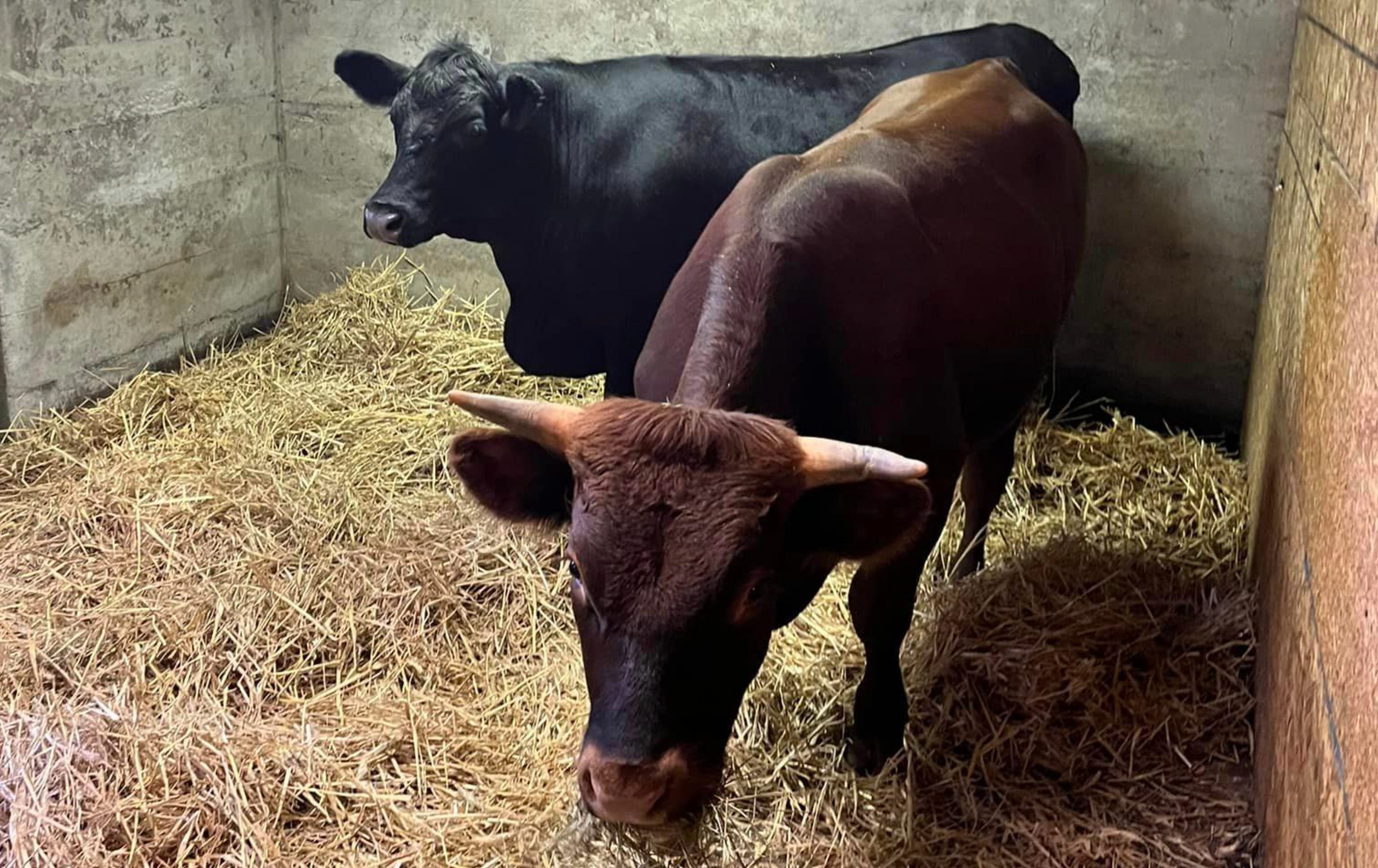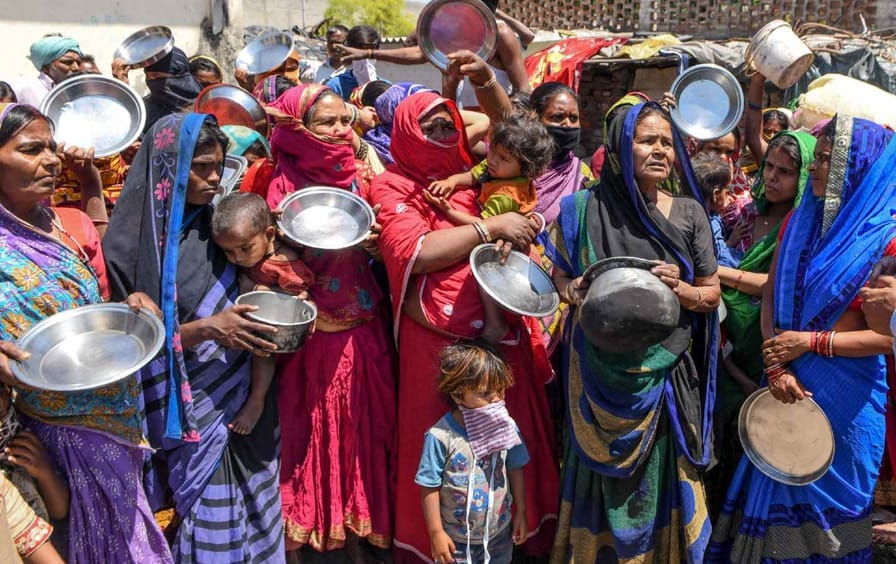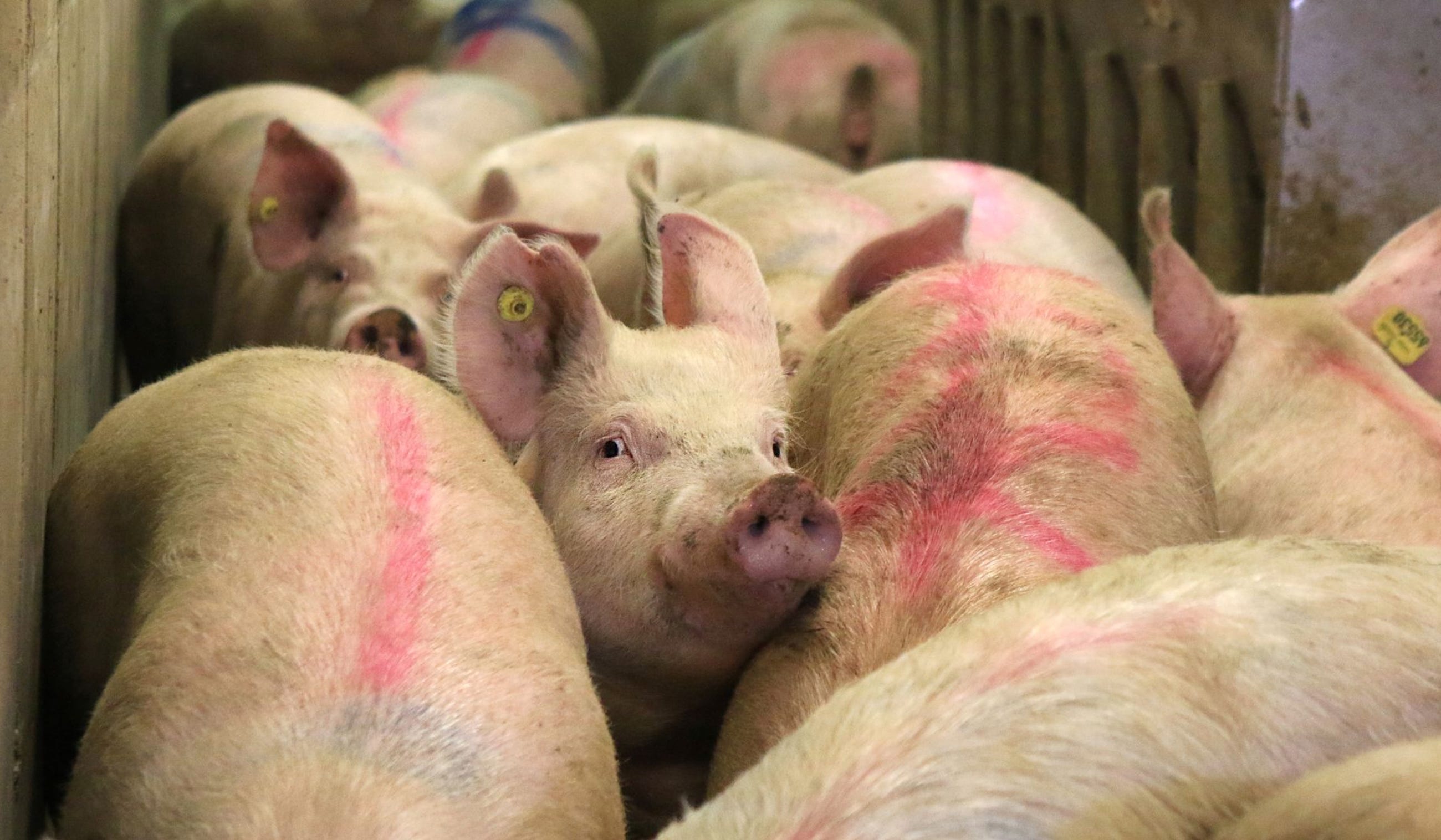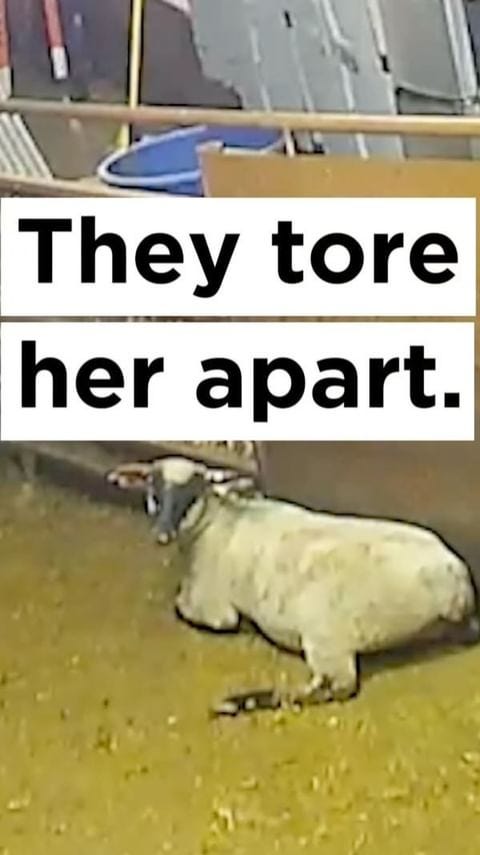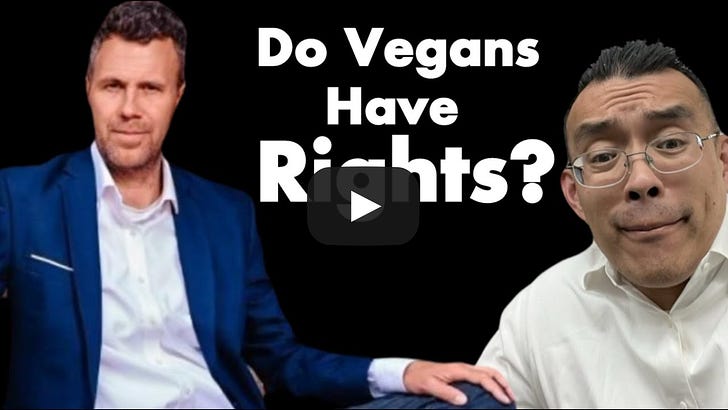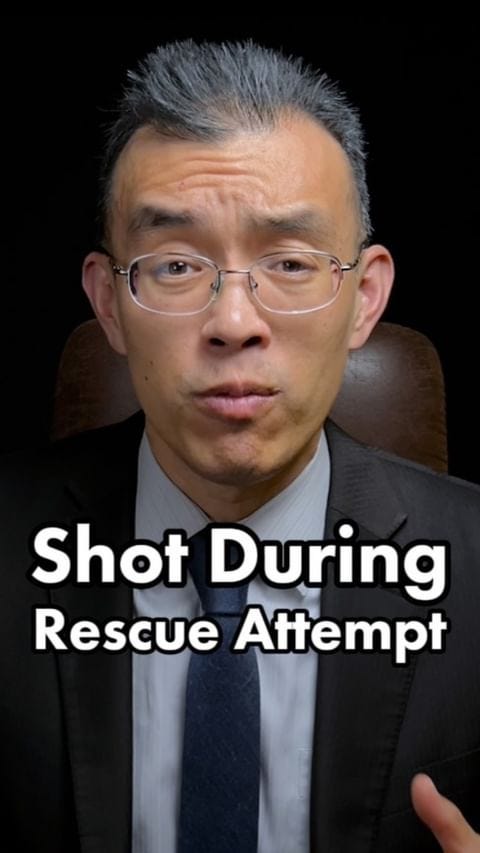|
The Wandering Cows and the Problem of Democracy
Democracy is under attack. But the greatest threat is not at the ballot box. It’s on our dinner plates.
The People v. Tracy Murphy might seem a strange place to find a national political crisis. It was a small case (petty theft of two cows) in an even smaller town (Newfane, New York, with a population of 3,234). And yet what unfolded in the last few weeks in her case, which was described by The New York Times as a “culture war,” shows the political sickness of America. Over the last two years, Tracy endured illegal police raids on her home, threats on her life (cheered on by government officials who delightedly invoked farmers’ right to bear arms), and numerous violations of her constitutional rights – all because she took into her care two stray cows, Ismael and Little Willow. While Tracy’s case ended in the dismissal of the charges last Friday, Ismael and Little Willow’s story ended with slaughter. They were unlawfully seized by the police and returned to their alleged “owner,” a cattle rancher who also happened to be a fellow New York state trooper.
The New York Times’ reporting, however, was wrong to describe this case as a “culture war.” The protection of animals is as culturally American as apple pie, with 80% of our citizens, including 77% of Republicans, seeing protection of farm animals as a personal moral concern. To the contrary, what unfolded in Newfane was far more insidious: a war on democracy. The fundamental principle of democracy, after all, is that our government acts for the people, not the powerful. And that principle was repeatedly violated in Tracy’s case.
A cattle rancher used his family relationship with a senior officer in the state police to have an innocent woman jailed and shackled. An oil tycoon used his wealth to push a mob of people, including two prominent leaders in the state Republican party, to threaten and seek investigations of “vegan extremists.” And, perhaps most disturbingly, officers illegally seized two individuals, Little Willow and Ismael, and sent them to their death. The poor animals were executed by the state for the crime of… being cows. In all of these instances, our government acted for the powerful, and not the people. By doing so, it undermined the fundamental principle of democracy.
Check out the latest episode of my YouTube show and podcast on why democracy requires animal rights.
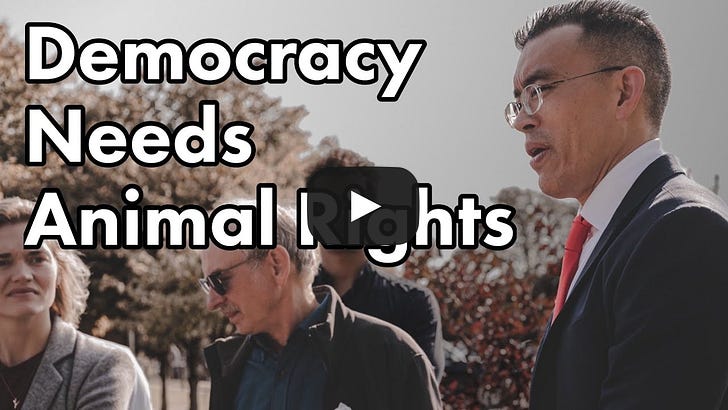
But, you might ask, surely there are greater threats to democracy than the illegal slaughter of two cows. There has been an immense amount of ink spilled in this election season on the future of democracy. Most recently, numerous pundits condemned Vice Presidential candidate JD Vance for refusing to admit that Trump lost the election in 2020. But most of this commentary is political theater with no relevance to ordinary people; the real threats to democracy have been unfolding for many decades and supported by both political parties. And the solution to these threats lies, not at the ballot box, but on our dinner plates.
This is a provocative claim that I’ll come back to. But, first, what do I mean by “threats to democracy”? True democracy, by acting for the people rather than the powerful, protects the people’s most basic needs: food, shelter, and safety. The Nobel-winning economist Prof. Amartya Sen, for example, found that “[n]o famine has ever taken place in the history of the world in a functioning democracy.” This is because, when a government acts for the people, food is sent to the hungry. This is just one example of how democracy aligns the government with the needs of the people. But, across the globe, government is no longer serving that function due to concentrations of economic and political power.
Consider food: our diets are now the leading cause of preventable death in America, driven by corporate manipulation and greed. And this deadly system is subsidized by our government to the tune of tens of billions of dollars a year. (Most of this money goes to corporate giants like Smithfield Foods, which receives hundreds of millions of dollars in government benefits to dupe Americans into eating carcinogenic meat.)
Or shelter: a record 50% of American renters are now “cost burdened,” i.e., spending more than one-third of their income on housing. Yet our government has made it more, not less, difficult for ordinary people to find a home. Homelessness is at record highs.
Or, finally, safety: Americans are feeling unsafe at levels not seen in three decades. The leading cause of this is an epidemic of loneliness; humans are social animals who are scared when we are alone. Yet our government invests far more in bombs than in bowling alleys – literally tearing people apart rather than bringing them together.
In all of these ways, our government is no longer acting on behalf of the people. To the contrary, like the authoritarian regimes studied by Prof. Sen that allowed their own people to starve, our government is undermining the fundamental principle of democracy by acting primarily for the powerful.
But that brings me back to that provocative claim: defending democracy begins on our dinner plates. The greatest threat to democracy, when we understand its most fundamental principle, is what is happening to animals. Martin Luther King, Jr famously said, “Injustice anywhere is a threat to justice everywhere.” This is not just a moral but a factual claim, supported by research done by the distinguished economist Prof. Daron Acemoglu. When we see that our government is unjustly exploiting those who have no power, Prof. Acemoglu’s research shows, we implicitly recognize that it could target us, too. That undermines our faith in government – and causes nations to fail.
Violence against animals, in both scale and severity, is the greatest form of unjust exploitation in our planet’s history. That makes it the greatest threat to democracy, too. How can we trust our government to defend our right to food, when it allows powerful industries to starve billions of sick and injured animals to death? How can we trust our government to provide access to shelter, when it burns down the homes of millions of wild animals to make room for cattle feedlots? And how can we trust our government to protect our safety when it funds the greatest engine of terror – the mass extermination of animals – in the history of this planet?
Tracy’s case illustrates this problem, but also the solution. A government that favors powerful animal abusers, over ordinary people like Tracy, is not one that is truly democratic. Time and time again, that is precisely what has happened – most bizarrely when the federal government raided two animal sanctuaries in an effort to track down sick piglets I rescued from Smithfield Foods. However, if a relatively-powerless woman can go against power and win, then it shows that our democracy is robust. That is precisely what happened in court last week.
But this same point can be made even more strongly with respect to protection for animals. Imagine Tracy was not present at the sanctuary on that day when powerful men raided her home in an effort to hurt two cows. But imagine, contrary to what happened, that our government intervened to protect the two gentle creatures, rather than send them to slaughter. That would show us something important about democracy: that even the most powerless beings in our society will be protected against the most powerful.
I’ve called this test – how do we treat the most powerless in our society – the “moral stress test.” And passing this test is the only way for us to truly defend democracy. And the remarkable thing about this test is that, unlike voting every few years, each of us has the ability to defend democracy every day on our dinner plates.
Of course, there is so much more that each of us can and must do. Lawyers can litigate. Rescuers can rescue. And all of us can contribute in ways small or large to creating a more democratic society. But while not all of us will make the sacrifice that Tracy made, all of us can play some role. In the long term, that won’t just save animals like Ismael and Little Willow. It will defend the fundamental principle of democracy – government for the people, and not the powerful – and protect all the sentient beings of this Earth.
What’s up this week?
Direct Action Everywhere released an investigation of the largest lamb slaughterhouse in the nation — weeks before Denver residents will vote on whether to shut the facility down. The Intercept published a great piece on the investigation and vote. I’ll have more say about this in the weeks to come, but here’s video with some of the investigation’s most disturbing findings.
If you have questions about what happened at Tracy’s trial — or want to learn more about the Ridglan special prosecutor hearing in less than two weeks — join our Open Rescue Advocates Meeting this Sunday at 3 pm PT. Here’s a link to register! We’ll be meeting both in person in San Francisco and also via Zoom. If you want a preview of things we might discuss, check out this conversation I had with my co-counsel on the case, Prof. Justin Marceau.
Police shootings of animals have been in the news, including the killing of a blind shih tzu and a happy-go-lucky pig. These incidents are, in many ways, demonstrations of my thesis about democracy and animal rights. Here’s more about the shootings.
I’m sorry to end the newsletter on such a negative note. But remember that on October 23, we’ll have a chance to save 3000+ dogs from Ridglan Farms. I hope you’ll join us on Sunday at 3 pm to discuss.
Thank you for reading The Simple Heart! To help us reach more people, become a donor today.
